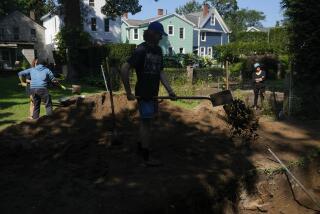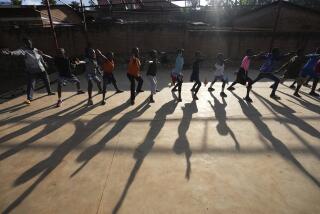Gruesome Secrets of Bulgaria’s Past Unearthed in Forest : Eastern Europe: Mass graves show evidence of Communist killings. The discovery has mobilized opposition groups as elections near.
- Share via
KOZAREVETS, Bulgaria — After 40 years of searching, Dobri Kiranov thinks he has found his father--in a pit full of twisted bones, teeth and skulls.
“This could be him,” Kiranov said, crouching above a long skeleton splayed over the remains of six other men in a freshly discovered mass grave, its bony feet still wearing shoes.
“My father was 190 centimeters (6 feet, 3 inches). The belt this one is wearing looks like the one I used to remember when I was a child, but I can’t be sure.”
Kiranov’s father, a lawyer, was one of thousands of Bulgarian intellectuals and businessmen who were arrested by Communists and disappeared after the Soviet army invaded during World War II.
For four decades, their fate remained a mystery, and many relatives were simply too afraid to ask questions.
Now, however, with less than a month to go until Bulgaria’s first free elections since 1946, people who knew how or where secret executions took place are coming forward with evidence that has led opposition activists to dozens of mass graves across the country.
“In the past, people who knew something kept quiet out of fear,” said Yoncho Donchev, a member of the opposition Union of Democratic Forces, who is leading the dig in a tranquil oak wood near the rural village of Kozarevets.
“But now before the elections a lot of people are starting to talk.”
Donchev and a team of some 20 other volunteers started digging at the site after piecing together stories they had heard from villagers and local farmers.
Some told of trucks with license plates from different regions arriving late at night during the fall of 1944.
Others said they had seen dogs and wild animals digging freshly turned earth and chewing human limbs.
Searching the woods earlier this month, Donchev and his team noticed several areas where the earth dipped unnaturally and there were fewer trees.
After about 40 false starts, with no idea of how deep to dig and without the help of metal detectors, they unearthed one complete grave, started work on three others, and estimated there could be up to 270 bodies in the Kozarevets woods alone.
“This could be the Bulgarian version of Katyn,” said local opposition leader Lyubomir Yordanov, referring to the murder of more than 4,000 Polish officers at Katyn forest near Smolensk during World War II.
The Soviet Union admitted responsibility for the Katyn massacre in April after maintaining for more than 45 years that it had been the work of the Nazis.
In the one fully excavated grave at Kozarevets, all the skulls contained small bullet-size holes. The hand of one skeleton, thought to be that of a local priest who disappeared, was clutching a prayer book.
“Only one skull was found near the body, all the others were separated,” said Nikola Alurkov, whose father and grandfather disappeared in October, 1944, when he was 14.
For the Union of Democratic Forces, founded six months ago and headed by former dissidents, revelations about Communist atrocities are valuable ammunition for their cause against the ruling Communists in advance of the elections June 10 and 17.
Revelations in April that there had been nearly 150 deaths at two concentration camps between 1959 and 1965 brought a shocked response from many Bulgarians, including a number of government leaders.
“The idea is clear--each new grave we find is a big minus mark in their campaign,” Donchev said.
Unlike its discredited counterparts in other East European states, Bulgaria’s Communist Party, now renamed the Socialist Party, still has popular support, particularly in rural areas.
Donchev said local officials seemed reluctant to organize an official investigation.
Some claimed that the bodies really belong to Communist partisan heroes murdered by fascists in the 1920s--a fact the government opponents say is ruled out by the discovery of bullets and coins from the 1940s in the graves.
According to Socialist Prime Minister Andrei Lukanov, the graves are a regrettable part of Bulgaria’s history, but no potential threat to the party’s election campaign.
“If you take Europe’s immediate postwar history in all countries where you had civil war--and we had civil war in Bulgaria--in Italy, Yugoslavia and France, you will see that these sorts of popular vendettas were unfortunately the rule in many places,” Lukanov said.
“I don’t think this will damage the party very much because people are aware of the very complex and tragic nature of the chain of events that led to this bloodshed and fratricidal conflict.”
But the men and women digging for their relatives in Kozarevets woods are convinced they are uncovering things that many influential Bulgarians would rather remained buried.
Kiranov said, “There are people who tell us: ‘You’ll soon be filling the holes you are digging with your own bodies.’ ”
More to Read
Sign up for Essential California
The most important California stories and recommendations in your inbox every morning.
You may occasionally receive promotional content from the Los Angeles Times.













